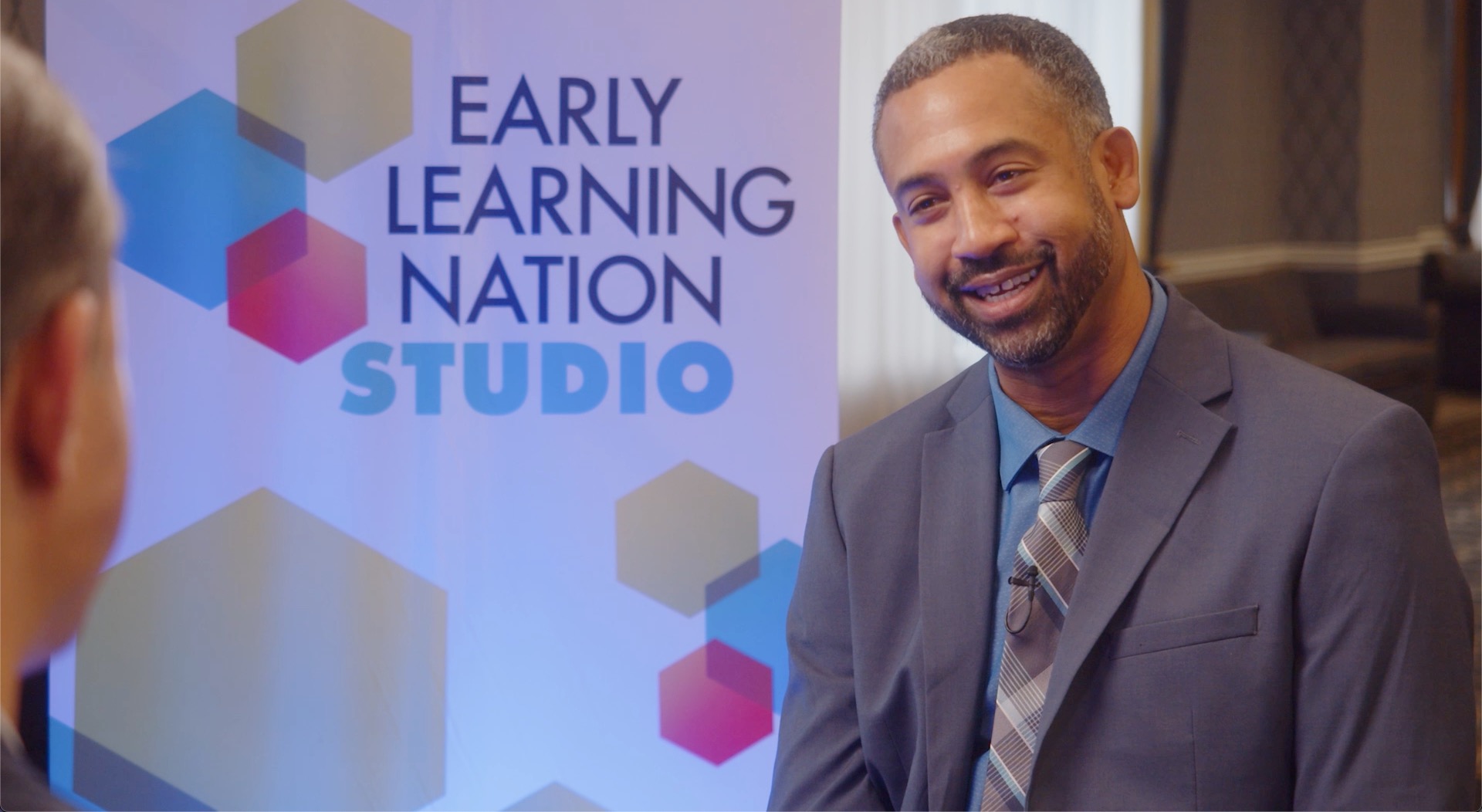Editor’s Note: The Early Learning Nation Studio recently attended the 2023 National Black Child Development Institute’s annual conference in Charlotte, NC. We had rich and illuminating conversations with early learning researchers, policymakers, advocates and practitioners of all ages. The full collection of video conversations can be found here.
How do you ensure that Eight Essential Outcomes for Black Child Development get to communities, schools, educators, leaders, researchers, policymakers and parents anywhere—or everywhere—in the U.S.? Build a National Village Network, explains NBCDI’s Director of Community Engagement.
Chris Riback: Kerron, thanks for coming to the studio.
Kerron Kalloo: Chris, it’s great to be here.
Chris Riback: And thank you for inviting us to this conference. It’s been fantastic.
Kerron Kalloo: Excellent.
Chris Riback: What is the National Village Network? How does it work?
Kerron Kalloo: The National Village Network is NBCDI’s local on the ground organizations, advancing our mission and ensuring that our partners and the communities are aware and are utilizing NBCDI’s Eight Essential Outcomes for Black child development.
Chris Riback: And who are you engaging with?
Kerron Kalloo: Absolutely. So when we think about what it means to be in a community, it really is everybody. And for Black children, whether you’re a librarian, a doctor, a banker, you are a person that makes an impact on a Black child’s life. So our villages, our organizations in the network, work with anyone, everyone that has a connection to or some kind of relationship with a Black child. And it’s that kind of desire that allows them to participate, volunteer, and engage. Typically, we see a lot of educators and parents. In the last couple of years, we’ve seen many researchers and policy leaders come on board.
Chris Riback: That’s got to be a good thing.
Kerron Kalloo: It’s a great thing. But I don’t think we should ever diminish all the other professions and types of people that are supporting our mission and working on behalf of our Black children.
Chris Riback: And what do you hear from them? What do you hear most significantly to me from the parents, from the educators, and to the extent you talk with them, the children themselves? But really the parents and the educators, what do you hear from them?
Kerron Kalloo: First and foremost, we hear that they find comfort in their local Black Child Development Institute and a place that they can trust. This is important because as we’re amplifying Black voices, we want those voices to be authentic. So they tell us about the challenges that they may face with their school administration, with the resources that are available in their community. And we make sure that not only do we survey and capture quantitative data telling their story, but take clips. Making sure that-
Chris Riback: Really capture it.
Kerron Kalloo: … Really, yes. Absolutely. And that way as we do our promotion statewide, nationally, people understand what our parents are really saying.
Chris Riback: You have the local people who are living it every day telling their stories.
Kerron Kalloo: Exactly.
Chris Riback: When they mention the concerns, are there any ones that come top of mind? What are you hearing maybe most often?
Kerron Kalloo: Safety is a major one. So safe communities is an area that many of our parents are concerned about. And we know the topic around diverse books is all over national news. So many of our families are just concerned about what kind of education they’re getting in their schools and what they can do to actually make a difference.
Chris Riback: I’m hearing a lot of commentary around mental health, mental wellness. Has that become more of a concern in the last couple of years? Are you seeing that or am I just hearing it more often today?
Kerron Kalloo: It is a major concern. When we think about the racial disparities that Black children and families face, it creates trauma, regardless. And that weighs heavily on the children, even the parents. And that type of mental wellness is our top priority. And so we really look closely at what it means to have support systems in our schools, what parents can do to access services outside of schools, and who they can trust in their community as local partners.
Chris Riback: And you mentioned previously the Eight Essential Outcomes for Black child development. I think we’ve been talking about a couple of them. Because they include health and education and nutrition, digital safety, representation, climate, narratives. You mentioned narratives a moment ago, the ability to tell those stories, and safe communities. Are these really the areas where you’re looking to make the most impact?
Kerron Kalloo: Absolutely. And we know that when we allow these areas to be our reality, that this is commonplace across our country, know our Black children are going to thrive. So we’re absolutely excited to work with our partners locally, nationally, to ensure that everyone’s aware of what is required for the United States of America to really empower our Black children.
Chris Riback: There’s a lot of work to be done.
Kerron Kalloo: 100%.
Chris Riback: Thank you for the work you’re doing. Thank you for coming by the studio.
Kerron Kalloo: Excellent. Thank you, Chris. I appreciate it.



